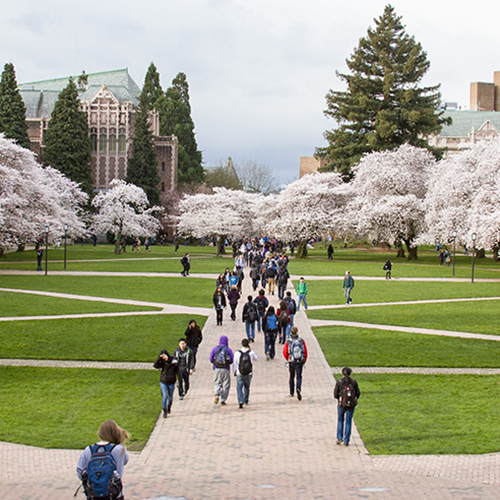It’s a rainy November morning. Judi Clark is still sipping her first cup of coffee as she welcomes a prospective student and his mother into her office. The student is nervous about getting into the University; the mother wants assurance that her son will be gainfully employed after graduation.
Clark, the School of Art’s director of academic advising and student services, can make no promises about UW admission or post-baccalaureate employment. But she spends half an hour with the mother and son, parsing the son’s interests in art and suggesting UW programs that would build on those interests.
It’s all in a day’s work for Clark, one of about 60 academic advisers in the College of Arts and Sciences.
“While advisers spend hours a day talking with current or prospective majors, we also meet with many people who may never set foot on campus again,” says Clark. “We’re like little ambassadors before they even apply to the University.”
A Privileged Position
These campus ambassadors have staying power. Many have been on the job for more than a decade, some for over 20 years
Clark joined the School of Art advising staff in 1990, after earning a master’s degree in art history from the School. “I fell into it,” she admits. “I quickly realized what a privileged position it was to work with students.”

About the same time, Melissa Wensel was hired as a half-time adviser in the Department of English while working toward a Ph.D. “I’d been a teaching assistant in the department for four years and didn’t even realize there was an advising office,” she admits. “That’s how low profile it was at the time.”
Wensel viewed advising as a temporary job, her long-term goal being a tenure-track academic position. But the longer she worked as an adviser, the more invested she became. “Students would leave my office saying, ‘Thank you so much. That really helped,’“ she recalls. “It was a rush.” When a full-time position opened up, Wensel realized opportunity was knocking. “I could ignore it or heed the call,” she says. “I chose the latter and have never regretted the decision.”
Other advisers have been similarly hooked by the chance to work with undergraduates.
“I love the place people are at when they’re in college,” says Janet Germeraad, director of academic services in the Department of Biology. “It’s not about their age. It’s about the transformative process of being opened up to so many ideas and possibilities and cultures. That changes and empowers people, and it’s wonderful to be a part of that.”
A Meaningful Conversation
Not all students seek out advisers. Some drop in for a handful of routine visits to review their progress or apply for graduation. Others come in frequently, viewing advisers as mentors. Then there’s everyone in between: New students wanting guidance in selecting courses. Students seeking internship information. Students panicked at the prospect of not being accepted into the major. Any visit can be a jumping off point for further discussion.
“The key is to have a meaningful conversation with students, not a rote one,” says Rick Roth, assistant to the chair and adviser in the Department of Geography. “Students are all too willing to treat it like a doctor’s appointment and be out in seven minutes. But it’s more like a therapist’s appointment. We encourage students to talk about their educational goals—their versions of their present and future selves.”
A student might arrive in an adviser’s office frustrated, facing the prospect of not being accepted into the major. That visit might lead to a pivotal conversation about the purpose of a UW education.
“Often I’ll help students strategize what to do to improve their chances of getting into the department,” says Carrie Perrin, director of academic services in the Department of Psychology. “But if they’re unlikely to get in, I’ll have the difficult conversation about other options. There are ways to have that conversation that will take the sting out of it and be proactive. There are often other ways for students to achieve their goals. Sometimes they just need help finding their footing.”
Most advising concerns are familiar. Wensel jokes that whenever a student comes in saying, ‘I have kind of a unique problem,’ she knows it’s going to be something she’s heard 20 times before. But there’s still the occasional surprise. And then there are the problems that go beyond the scope of an academic adviser.
“Students have very complicated lives,” says Wensel. “They frequently have tough personal lives that can impinge on their academic lives. If students want to talk about those things, how to balance their lives, sure, I’ll talk about them. But I make very clear the limits of what I can discuss with them. I’m not a professional counselor. I will refer them to the UW Counseling Center, or even walk them there if the situation seems urgent. But I know what my limits are.”
Where advisers really shine is in helping students identify their goals and interests, and then working with them to individualize their UW education.
Clark recalls how she drifted as an undergraduate, trying out “seven or eight” majors before choosing one based on accumulated credits rather than interest. She wants the students who come to her to avoid that fate.
“I’m comfortable with ambivalent students because I was where they are now,” says Clark. “Helping students define their interests and find opportunities that build on those interests—that’s the most exciting part. I love helping them see possibilities.”
Cynthia Caci likens those conversations to Amazon’s approach to recommending books. “You start by talking about a class they liked,” explains Caci, assistant director for academic services in Digital Arts and Experimental Media, “and then point out that people who liked that class often liked this other class. It gets the conversation going.”
A Link To Students and Faculty
Sometimes students arrive not wanting to talk about future plans but rather to vent about a course, a professor, or registration issue. That’s fine too, say advisers.
Students’ willingness to share with advisers has much to do with advisers’ welcoming demeanor. But there’s also the fact that, unlike faculty and TAs, advisers have no control over a student’s grade. That translates to a safe place to express frustration, confusion, or even anger. And students do express all three—sometimes in one meeting.
Students might be frustrated by course content, or by two required courses being offered at the same time. They might complain that a subject that fascinates them is not covered in any class. Advisers take note of students’ complaints and—if they see a pattern—share that information with faculty, brainstorming how to address the problem. Students might be surprised to know that some of their comments have led to changes in scheduling and the development of new courses.

Having this unique insight into students’ needs and concerns makes advisers invaluable in curriculum planning. In many departments, they sit on curriculum committees; in some, they attend all faculty meetings, sharing their unique expertise.
Sometimes that means injecting an unwelcome dose of reality. “One of my least favorite roles is to reign in faculty fantasies,” says Wensel. “They’ll come up with some elaborate structure of sequenced courses that just won’t work given the structure of our university and the way students register for classes. We know that because we deal with registration issues all the time. Faculty don’t.”
More enjoyable are conversations with faculty about how best to achieve student learning goals. Wensel was a key player when the Department of English began the long process of transforming its curriculum three years ago. A series of core courses was added, sequenced to take students through courses of study in a developmentally appropriate way.
“I was involved in the discussion at every level, from brainstorming ideas in the earliest stages to refining individual course concepts,” says Wensel. “It really does affirm the notion that advisers are educators who work in partnership with faculty.”
Roth has played a similar role in the Department of Geography. Unfamiliar with the field when he started his job two decades ago, he spent much of his first year sitting in on geography classes. Through that experience and conversations with geography majors, he discovered that the curriculum was “piecemeal and haphazard and wasn’t being well explained to students.”
The department invited Roth to become involved in curriculum planning. He tackled long-ignored logistical problems, such as the scheduling of several required courses at the same time. But he also pushed the department to clarify how the curriculum prepares students for geography careers.
Roth spearheaded the Geography Learning Objectives and Outcomes Project (G-LOOP), through which all geography faculty identified the desired outcomes for each of their courses and explained how the course design builds toward those outcomes.
“Faculty had to share the inner logic of their courses,” recalls Roth. “When they articulated this, it really helped students understand how the course content fits together.”
Roth also conducted a departmental study of undergraduate learning, interviewing a cohort of majors several times over two years to see if their perceptions of
what they had learned matched the faculty’s perceptions of what they were teaching. The results are proving integral to a redesign of the geography curriculum and major requirements.
Calming Career Anxiety
Ask any Arts and Sciences adviser what worries students most, and the answer is likely to be the same: landing a good job after graduation. Across the College, the refrain is repeated: What kind of job can I get with this degree?
Germeraad attributes much of students’ career anxiety to parental pressure. She finds that parents’ questions are often driven by economics—usually some version of, “What are we going to get for our money?” Germeraad’s answer: Your child will get an education that is priceless. “It may sound clichéd,” says Germeraad, “but it’s true.”
That said, Arts and Sciences advisers care deeply about helping students succeed after college. In Germeraad’s department, where many students arrive with a “pre-med” mentality, showing them that an M.D. is not their only option is an important first step.
Germeraad helps plan Career Discovery Week, an event that highlights a myriad of career options. Her office also offers resumé and cover-letter workshops and plans networking events with department alumni.
It can be a real eye-opener for students to hear from successful alumni who had once been in their shoes. “My favorite part is when alumni tell students, ‘I thought I knew what I wanted to do, but it didn’t work out that way,’” says Germeraad. “Students see that careers can wind and twist. It’s not always a straight line.”
Of course the college years can wind and twist as well. Ensuring that students find success, despite some bumps along the way, is what keeps Arts and Sciences advisers motivated and engaged, year after year.
“Students will tell you, in one way or another, that you believed in them and that has been really valuable,” says Perrin. “Witnessing that—seeing them succeed— is very gratifying. That’s what it’s all about.”
More Stories

Dancing Across Campus
For the dance course "Activating Space," students danced in public spaces across the University of Washington's Seattle campus this spring.

Four Students Shine as 2024 Dean's Medalists
Meet the four new graduates honored as College of Arts & Sciences Dean's Medalists for 2024.

Celebrating Contemporary Indigenous Music
Markus Teuton, a musician and citizen of Cherokee Nation, explores contemporary Indigenous music through his academic work and as host of “Indigenous Jazz,” a radio show.